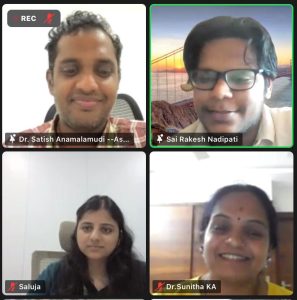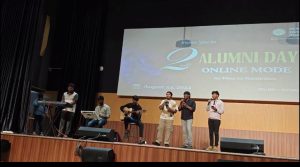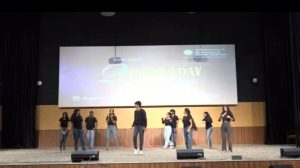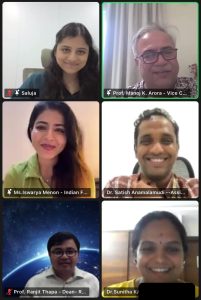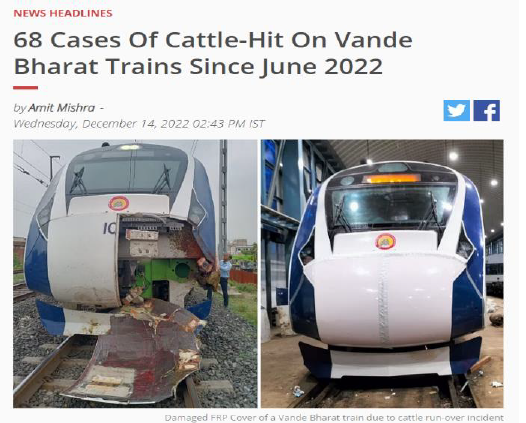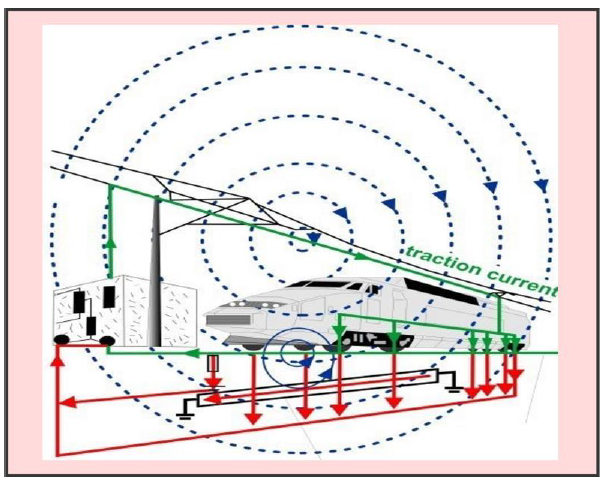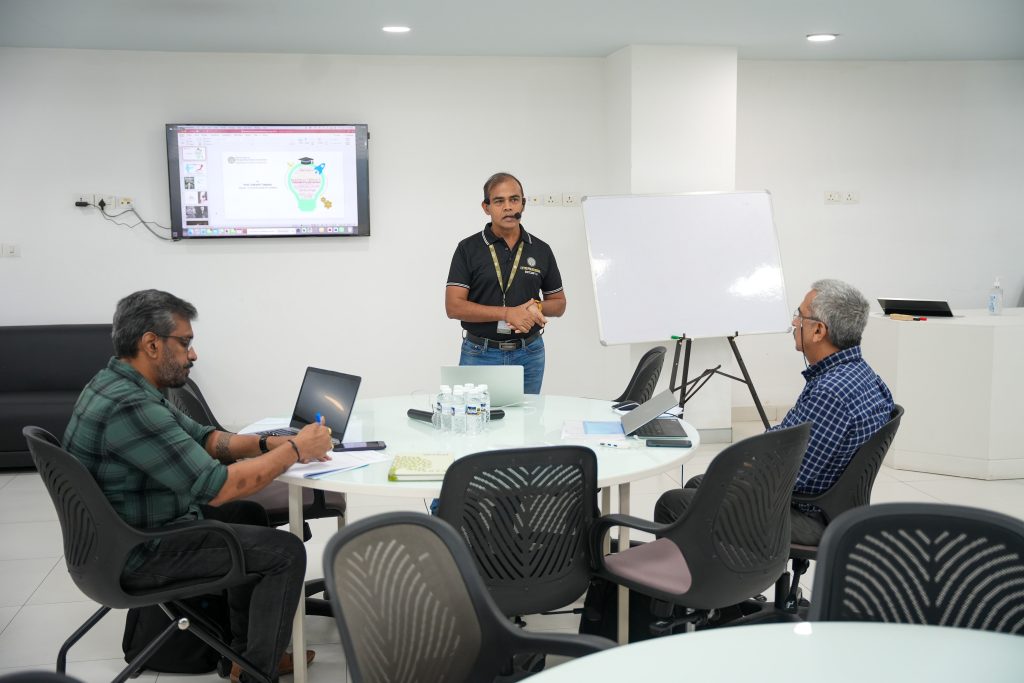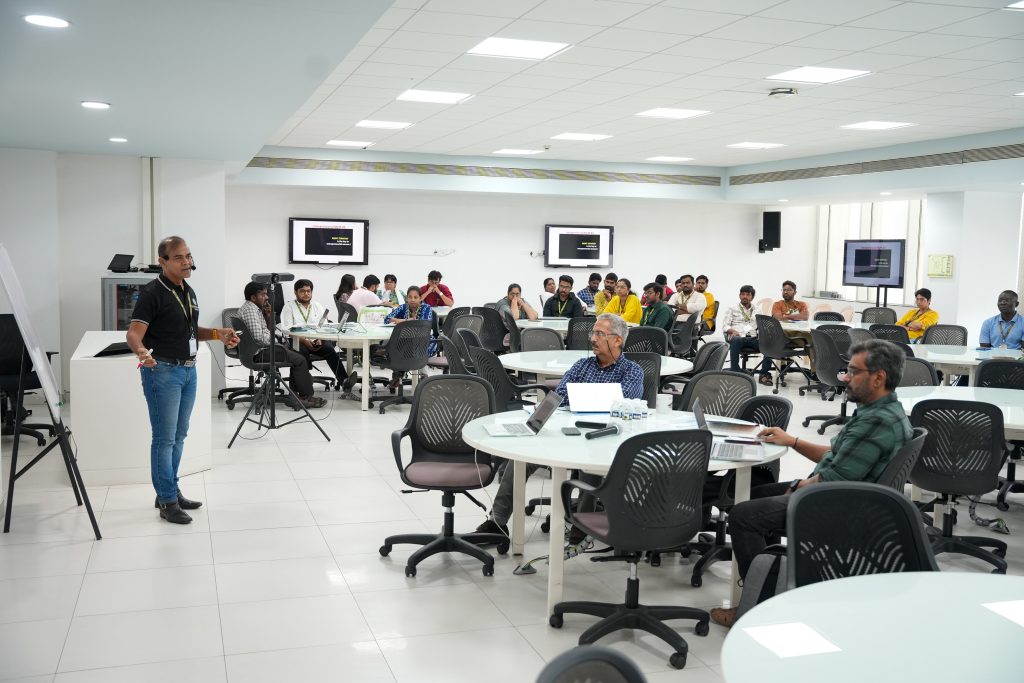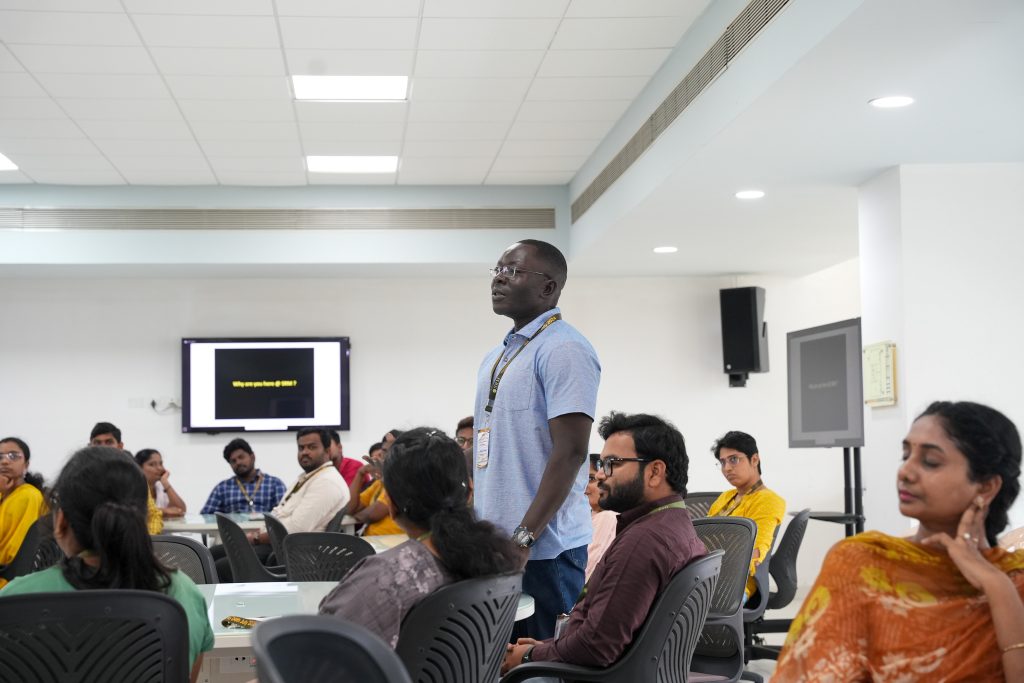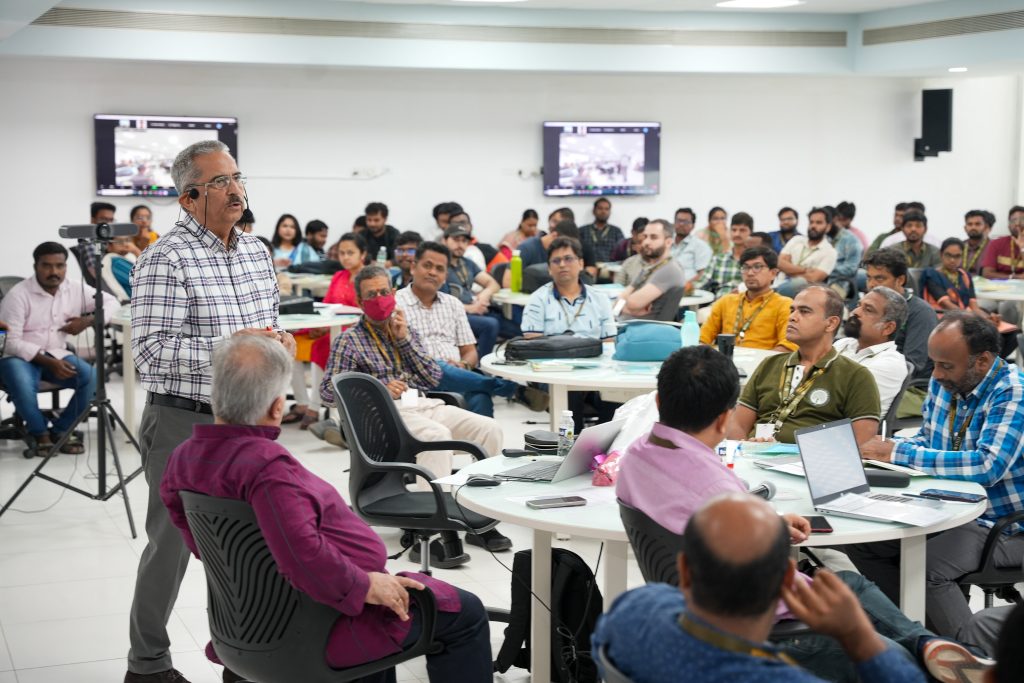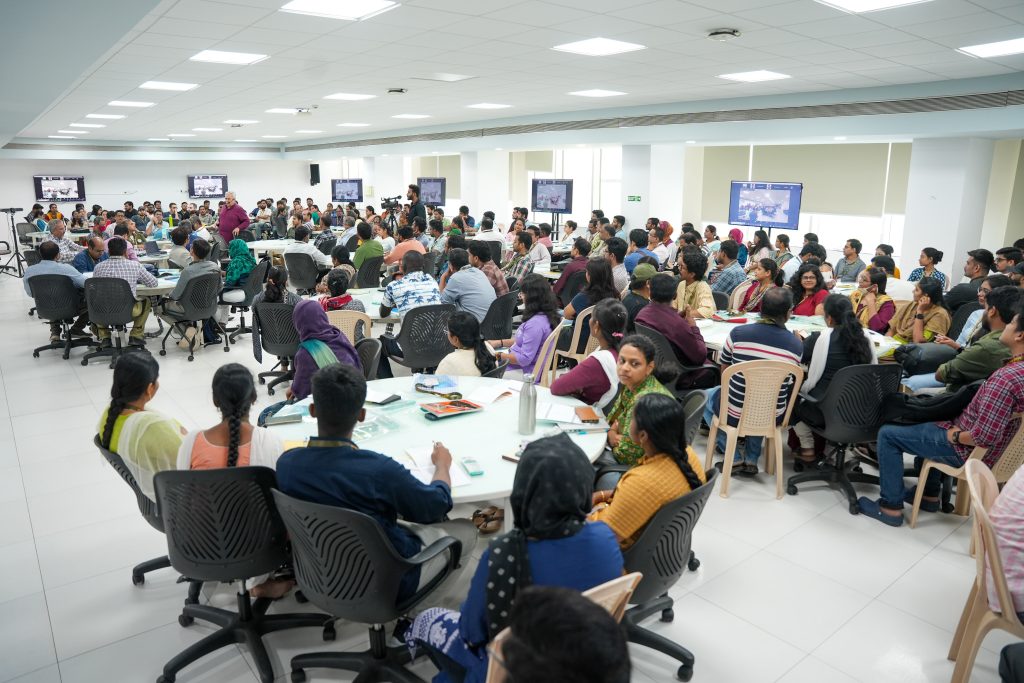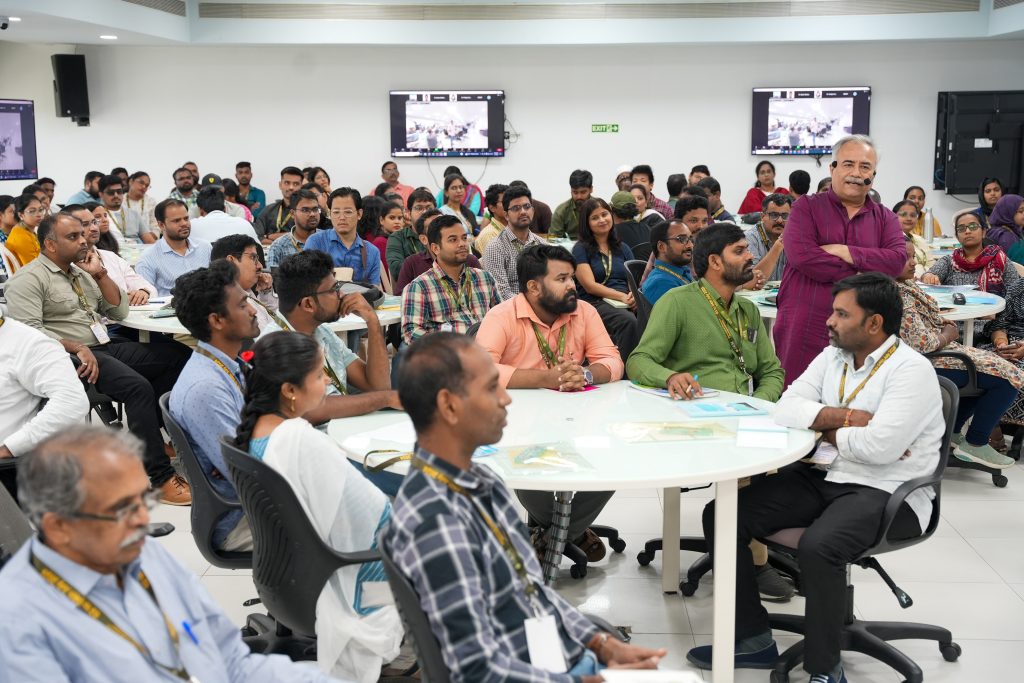Research Paper on ESG Scores and Their Effect on Polluting Companies After COVID-19
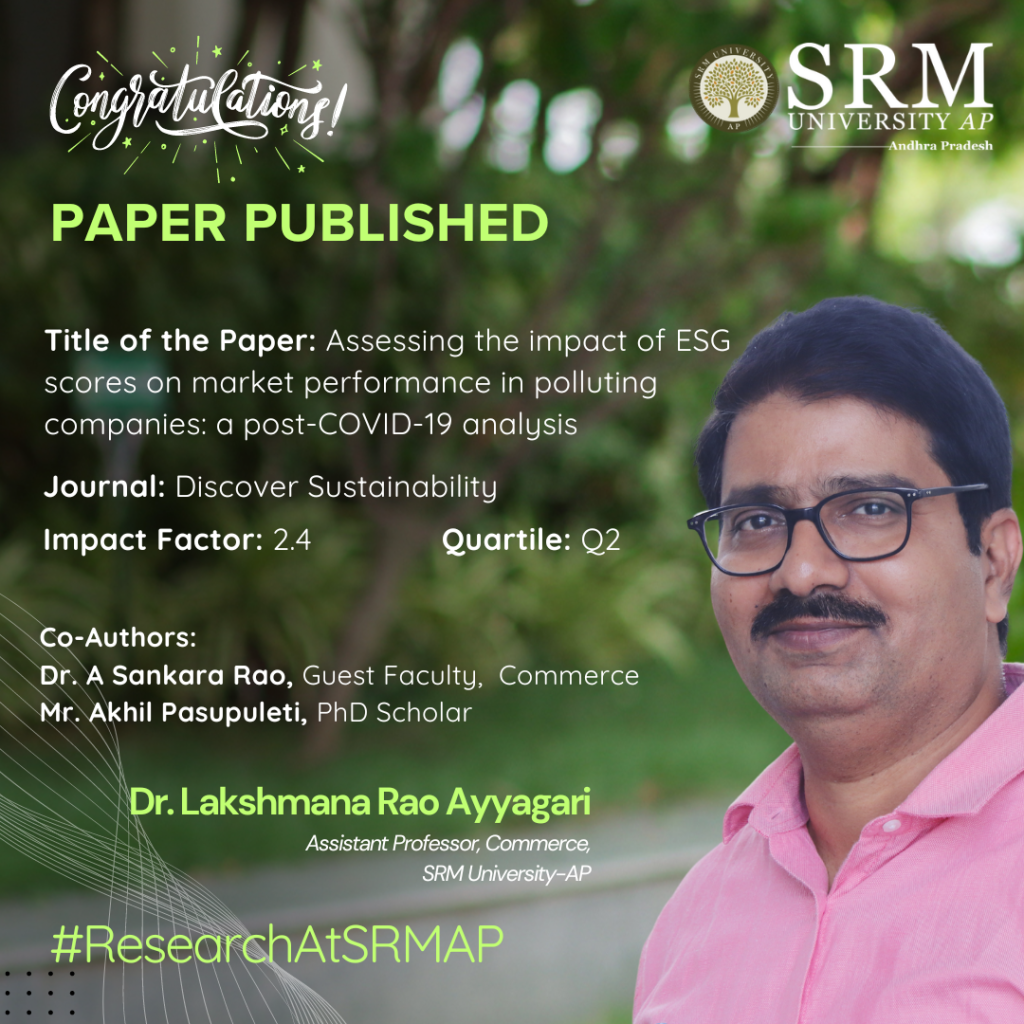
The Department of Commerce, under the Paari School of Business, is proud to present the research publication of Dr Lakshamana Rao Ayyangari, Guest Faculty Dr Sankar Rao, and Research Scholar Mr Akhil Pasupuleti. Their research paper, titled “Assessing the impact of ESG scores on market performance in polluting companies: a post-COVID-19 analysis,” is featured in the Q2 journal “Discover Sustainability.” Here is an interesting abstract of their research.
Abstract:
The study aims to unravel the impact of Environmental Social Governance (ESG) scores on the firm’s market performance of polluting companies. Moreover, the study also finds out the moderating effect of green initiatives. The study’s population consisted of 67 companies that were chosen from the list of polluting companies given by the Central Pollution Control Board of India for the post-COVID-19 timeframe of 2020–2023. The results indicate that the performance of ESG will improve the financial performance of the company.
Practical Implementation:
The analysis showed that companies with higher ESG scores generally perform better in the market. This means that firms that are more responsible in terms of environmental, social, and governance practices tend to do well financially. However, the study found that green initiatives did not have a significant impact on this relationship.
These findings are important for company managers and stakeholders. Understanding the connection between ESG practices and market performance can help managers create strategies to improve their ESG scores, ultimately boosting their financial performance.
Future Research Plans:
i) Focus on the R&D investment and sustainability.
ii) Studying the relationship between green finance and sustainability
iii) Exploring the relationship of CSR in sustainability
- Published in Commerce Current Happenings, Departmental News, News, Research News
Honouring the Founder’s Legacy: Celebrating the Vision and Impact of an Inspiring Leader
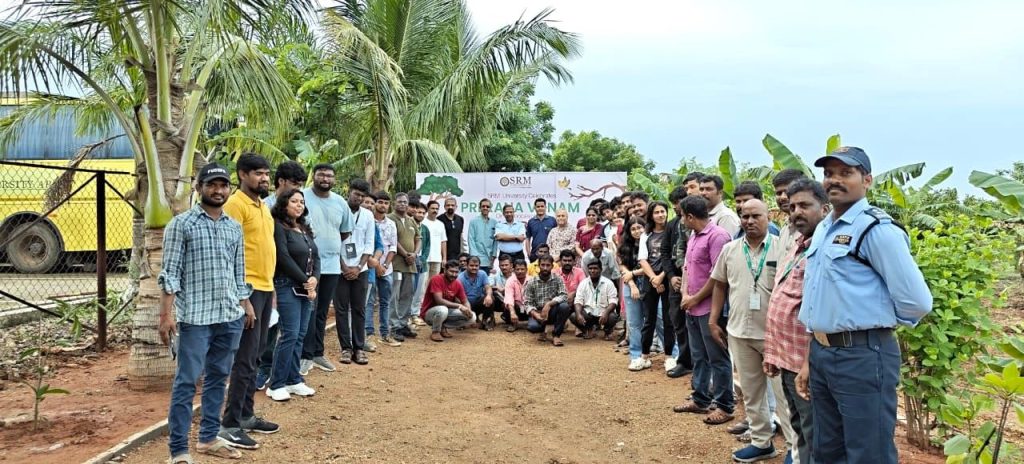 On August 24, 2024, SRM University-AP commemorated a significant event marking the 85th Birthday of the esteemed Founder Chancellor of the SRM Group, Dr T R Paarivendhar, celebrating his visionary leadership and contributions. In honour of this day, and reinforcing the ethos of sustainability and environmental consciousness, the university launched “Prerna Vanam,” a plantation-drive initiative.
On August 24, 2024, SRM University-AP commemorated a significant event marking the 85th Birthday of the esteemed Founder Chancellor of the SRM Group, Dr T R Paarivendhar, celebrating his visionary leadership and contributions. In honour of this day, and reinforcing the ethos of sustainability and environmental consciousness, the university launched “Prerna Vanam,” a plantation-drive initiative.
This annual initiative served as a testament to the varsity’s ongoing efforts to contribute positively to the environment, aligning with global sustainability goals and the founder’s visionary ideals. As we face the challenges of global warming, the varsity comes together to combat climate change, support biodiversity, and ensure a sustainable future. The event held at the university campus was attended by students, staff, and faculty members of the university and helped set a practical example of how institutions can play a pivotal role in making the world a better place for future generations by investing in ecological sustainability.
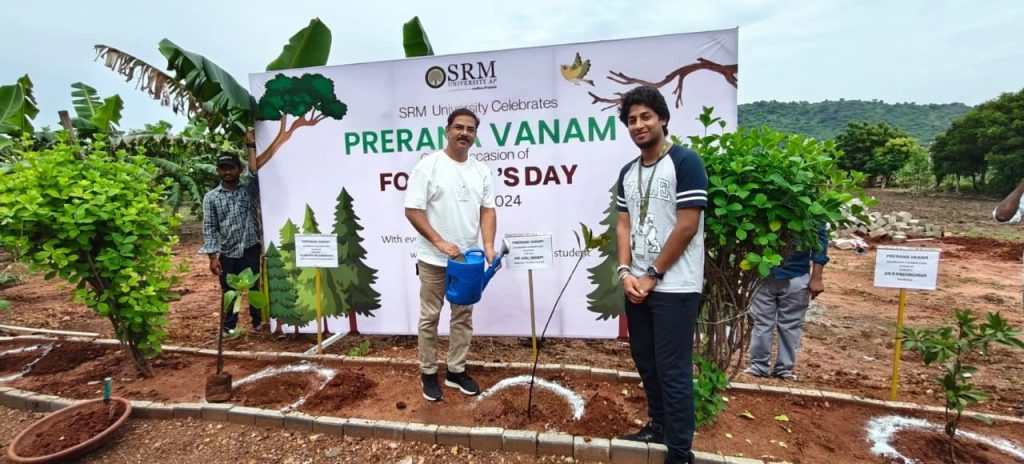
- Published in News, University Event
Nurturing Vision, Inspiring Futures: 2nd Alumni Meet Celebrated
SRM University-AP conducted its 2nd Virtual Alumni Meet on August 24, 2024, coinciding with the birthday celebration of the Founder Chancellor of SRM Group, Dr T R Paarivendhar.
The meet attracted a diverse group of alumni, including South Indian film actress and former SRM student Ms Iswarya Menon, who served as the chief guest. Vice Chancellor Prof. Manoj K Arora addressed the alumni with a compelling message about their role in shaping the future. He emphasised the importance of alumni involvement, stating, “Your contributions are crucial as we work towards becoming a developed nation by 2047.” Prof. Arora highlighted how the alumni’s active participation in building an alumni corpus and supporting the university will play a key role in driving the institution’s progress and fostering future generations of leaders.
He further noted that the alumni’s continued engagement not only benefits the university but also strengthens the support network available to current and future students, ensuring the sustained success of the varsity’s mission of excellence.
Chief Guest Ms Iswarya Menon, a former SRM student, expressed her heartfelt gratitude to the institution. “The guidance and support I received from SRM have been pivotal in my career development. I am truly grateful for the foundation laid here, which has significantly shaped my professional journey.”
The group of former students communicated their profound appreciation for the varsity, emphasising the significant impact it has had on their lives. They reaffirmed their commitment to actively support the university’s various initiatives and to aid in its continued growth and success.
Dr Satish Anamalamudi, Assistant Director-Alumni Relations, acknowledged the importance of alumni engagement. He remarked, “Your continued connection with SRM University-AP is essential for our growth and success.”
The event was further enlivened by performances from both alumni and current students, adding a dynamic and festive atmosphere that showcased the vibrant spirit and creativity at SRM University-AP. Registrar Dr R Premkumar, along with the deans and faculty, attended the gathering, reinforcing the strong and enduring bond between SRM University-AP and its alumni.
- Published in Alumni, Alumni Relations, News, University Event
Dr Dwivedy and Dr Nagasai Upgrade CMT Technology
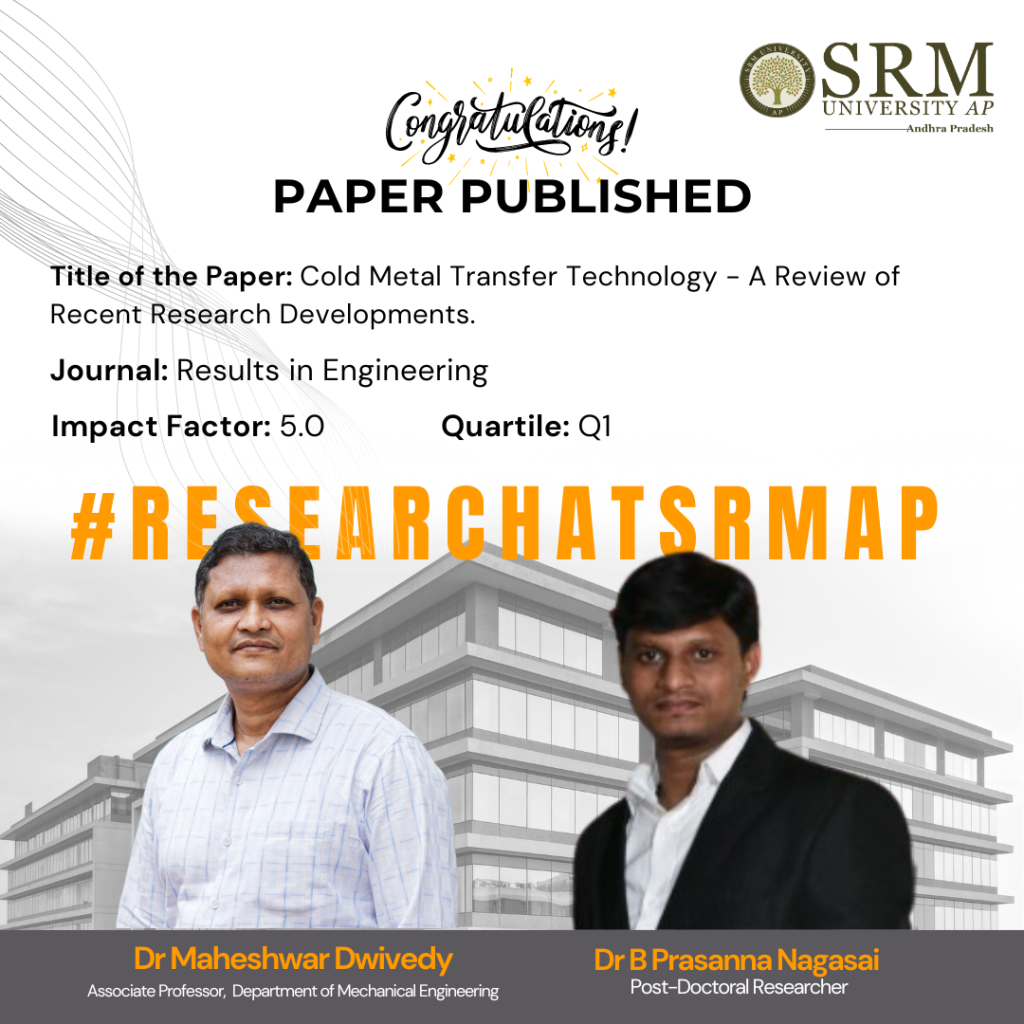
Dr Maheshwar Dwivedy, Associate Dean of Practice School, and Associate Professor, at the Department of Mechanical Engineering, SRM University-AP in collaboration with his post-doctoral scholar, Dr B Prasanna Nagasai, have joined forces to combine artificial intelligence with Cold Metal Transfer (CMT) Technology. Their research paper, “Cold Metal Transfer Technology – A Review of Recent Research Developments,” featured in the Q1 journal, Results in Engineering promises to make a significant impact on automobile, aerospace, oil and gas manufacturing industries, and that’s not all the research will also generate employment opportunities, and empower engineers to deliver enhanced services.
Abstract:
Cold Metal Transfer (CMT) technology has emerged as a promising welding technique, offering numerous advantages such as reduced heat input, minimal spatter, and enhanced control over the welding process. This paper provides a comprehensive review of recent research developments in CMT technology, focusing on its history, variants, recent advancements, and future perspectives. Initially, the paper traces the historical development of CMT welding, highlighting its evolution and the introduction of various CMT variants with distinct characteristics and applications. Recent studies have focused on optimising CMT process parameters to improve weld quality and productivity, leading to advancements in parameter control, arc stability, and wire-feeding mechanisms. Additionally, research has explored the microstructural evolution and mechanical properties of CMT-welded joints for both similar and dissimilar metals, providing insights into material compatibility, joint design, and performance under various conditions. Specific applications such as Laser-CMT hybrid welding, CMT cladding, CMT wire arc additive manufacturing, and CMT welding for repair across various materials are examined, demonstrating the versatility of CMT technology. This review also addresses the challenges and methodologies for defect reduction in CMT welding, along with recommendations for best practices. Furthermore, the paper discusses the integration of artificial intelligence in CMT welding, exploring opportunities for enhanced weld quality, economic, and social implications, and future research directions.
Practical and Social Implications:
The practical implementation of this research on Cold Metal Transfer (CMT) technology can significantly impact various industries, such as automotive, aerospace, oil and gas, and manufacturing. By optimising CMT welding parameters and integrating advanced features like arc length control and waveform modulation, industries can achieve higher weld quality, reduce defects, and enhance productivity. This can lead to more reliable and efficient manufacturing processes, resulting in cost savings and improved product performance. Social implications associated with this research include the potential for increased job opportunities and skill development in the welding and manufacturing sectors. As industries adopt advanced CMT technology, there will be a growing demand for skilled workers trained in these techniques. Additionally, improved welding quality and reduced defects can lead to safer and more durable products, enhancing overall public safety and satisfaction. The integration of artificial intelligence in CMT welding also opens up new avenues for innovation and technological advancements, fostering a culture of continuous improvement and progress in the manufacturing industry.
Collaborations:
Dr V Balasubramanian,
Professor & Director,
Centre for Materials Joining & Research (CEMAJOR)
Annamalai University, Annamalai Nagar-608002, Tamilnadu.
Dr P Snehalatha,
Associate Professor & Head
Department of Mechanical Engineering,
Sri Padmavathi Mahila Visvavidyalam, Tirupati, Andhra Pradesh-517502, India.
Future Research Plans:
The upcoming work will concentrate on creating Functionally Graded Materials (FGMs) through Wire-Arc Additive Manufacturing (WAAM) by merging nickel and stainless steel. The goal of this research is to leverage the distinct properties of each metal to develop components suited for specialised high-performance applications. The primary challenges involve optimizing the interfaces between materials, refining the deposition processes, and ensuring strong structural integrity throughout the manufacturing process.
The link to the article: https://doi.org/10.1016/j.rineng.2024.102423
- Published in Departmental News, Mechanical Engineering NEWS, News, Research News
Revolutionising Cattle Safety
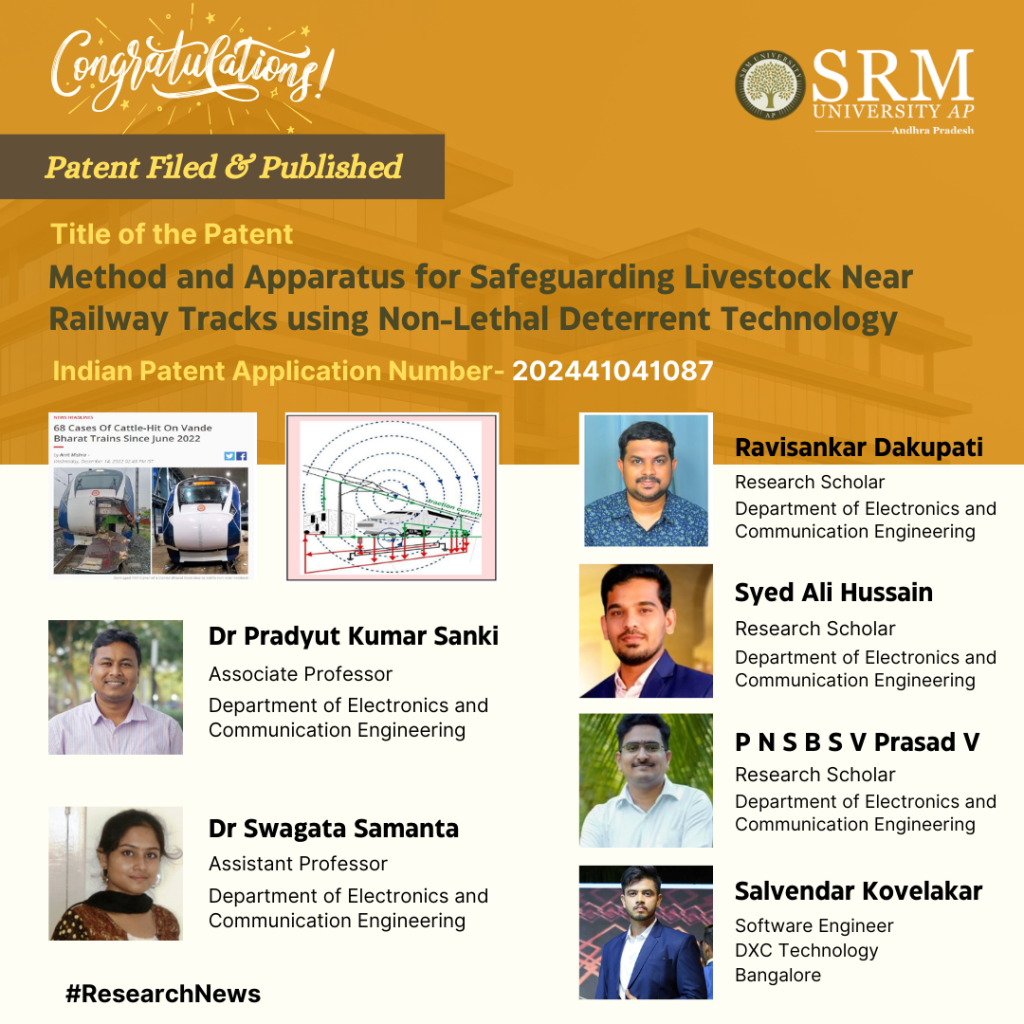
The Department of Electrical and Communication Engineering at SRM University-AP is delighted to announce the publication of a patent by its faculty, including Associate Professor Dr Pradyut Kumar Sanki and Assistant Professor Dr Swagata Samanta, along with research scholars Ravisankar Dakupati, Syed Ali Hussain, and P N S B S V Prasad V. The patent, titled “Method and Apparatus for Safeguarding Livestock Near Railway Tracks using Non-Lethal Deterrent Technology,” has introduced a groundbreaking solution that helps prevent accidents of wandering cattle. This innovative technology promises to protect livestock and minimise economic losses for cattle owners while championing the advancement of technology in countries like India.
Abstract:
Nowadays we have been hearing that Vandebharat express train hits cow, causing damage to both railways and cattle owners. We need to find a solution to this problem. These issues shouldn’t be hurdle for the growth of technology for developing countries like india. The technology we are going to use is a belt is worn by a cow. When the cow tries to cross near railway track it receives a Non-Lethal shock, makes the cow to scare and move back. All this circuit is operated with 7.4V DC
Practical implementation:
The practical implementation of the Anti-Track Cattle Band involves equipping cows with the device to prevent accidents near railway tracks. By detecting magnetic fields and delivering non-lethal shocks, the device ensures the safety of both the cattle and the railway infrastructure. This implementation can significantly reduce the risk of collisions and protect valuable livestock.
From a social perspective, the invention has several implications. It addresses the safety concerns of both animals and humans by preventing accidents and minimizing potential harm. By safeguarding livestock near railway tracks, the technology contributes to animal welfare and reduces economic losses for cattle owners. Additionally, the device promotes a more humane and proactive approach to mitigating risks associated with animal-human interactions in railway environments.
Collaborations:
The research on the Anti-Track Cattle Band involved collaboration among a team of inventors with diverse expertise:
Ravisankar Dakupati – Research Scholar at SRM University-AP
Salvendar Kovelakar – Software Engineer at DXC Technology, Bangalore
Syed Ali Hussain – Research Scholar at SRM University-AP
P N S B S V Prasad V – Research Scholar at SRM University-AP
Dr Pradyut Kumar Sanki – Associate Professor at SRM University-AP
Dr Swagata Samanta – Assistant Professor at SRM University-AP
This collaborative effort brought together individuals with backgrounds in research, software engineering, and academia to develop and implement the innovative Anti-Track Cattle Band technology.
Future Research Plans:
In future research for patent publication regarding “Apparatus and Method for Railway Livestock Protection,” the focus will likely be on enhancing sensor technology to detect animals more accurately over longer distances and in various conditions. This could involve integrating artificial intelligence and machine learning for improved detection and reducing false alarms. Additionally, there may be efforts to develop systems for remote monitoring and control, enabling real-time adjustments from a central location. Adaptability to different environments, collaboration for standardized protocols, cost-effectiveness, and assessing environmental impacts will also be key areas of interest. Overall, future research aims to create more effective, efficient, and sustainable solutions for protecting livestock around railway tracks
- Published in Departmental News, ECE NEWS, News, Research News
A Breakthrough Patent for the Automated Abnormality Detection System
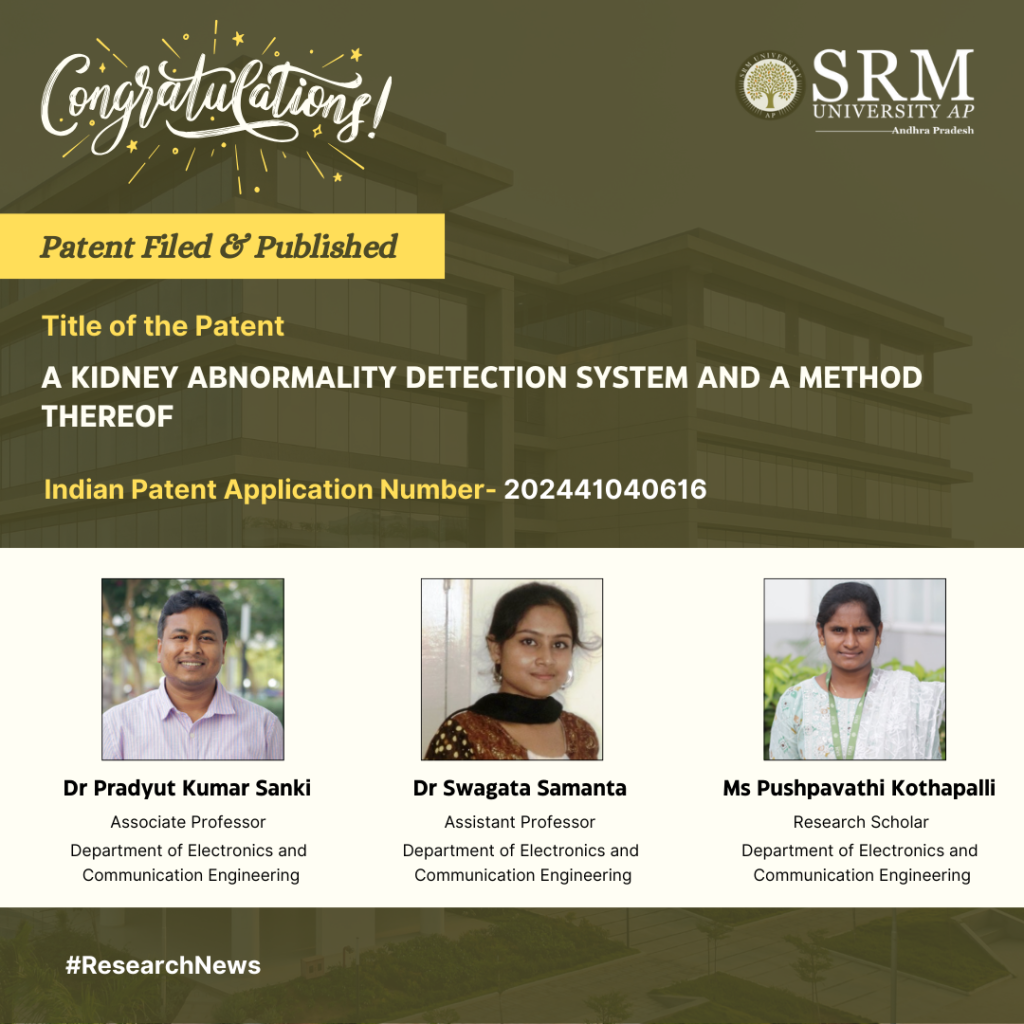
Dr Pradyut Kumar Sanki, Dr Swagata Samanta, and research scholar Ms Pushpavathi Kothapalli from the Department of Electronics and Communication Engineering published their patent titled “A Kidney Abnormality Detection System And a Method Thereof,” with Application No. 202441040616. This innovative method, which utilises advanced deep learning techniques, promises to revolutionise the accuracy and efficiency of kidney disease diagnosis. With the potential for widespread clinical adoption, this technology aims to enhance patient care, offering a brighter future for kidney disease detection and treatment.
Abstract:
This research work aimed to develop a method for detecting kidney diseases, including kidney stones, cysts, and tumors. The method achieved high accuracy in detecting kidney diseases, with a good mean average precision, precision, and recall. The study used techniques to select the most relevant features for kidney disease detection, identifying top features related to blood tests and patient health. The method outperformed other approaches in terms of accuracy, precision, and recall. The study used a comprehensive dataset of kidney disease patients to train and test the method. The results suggest that the method has the potential to be widely adopted in clinical settings, contributing to more accurate and efficient diagnostic tools for kidney disease detection and improving patient care.
Practical implementation:
The practical implementation of our research involves deploying a system for real-time detection and classification of kidney disease, including kidney stones, cysts, and tumors. The method achieved high accuracy in detecting kidney diseases using the Deep learning technique. Our model can quickly identify the disease of the kidney. The study used techniques to select the most relevant features for kidney disease detection, identifying top features related to blood tests and patient health. The method outperformed other approaches in terms of accuracy, precision, and recall. The study used a comprehensive dataset of kidney disease patients to train and test the method. The results suggest that the method has the potential to be widely adopted in clinical settings, contributing to more accurate and efficient diagnostic tools for kidney disease detection and improving patient care.
Future Research Plans:
The future plans for the work on chronic kidney disease (CKD) detection and management involve several key areas:
1. Improved Screening and Diagnosis: Update the United States Preventive Services Task Force (USPSTF) recommendation for CKD screening to reflect current evidence supporting routine screening for high-risk asymptomatic adults.
2. Enhanced Patient Engagement and Person-Centered Care: Advance education of primary care clinicians about CKD risk factors, testing, detection, and interventions that are graded and proportional to the eGFR and uACR risk stratification or heat map.
3. Advancements in Nephrology: Develop novel therapeutic strategies, such as wearable artificial kidneys, xenotransplantation, stem cell-derived therapies, and bioengineered and bio-artificial kidneys, to improve renal replacement therapies and address the shortage of kidney donors.
4. Machine Learning and Predictive Modelling: Continue to evaluate and improve machine learning approaches for early CKD diagnoses, focusing on reducing the number of input features and enhancing the accuracy of prediction models.
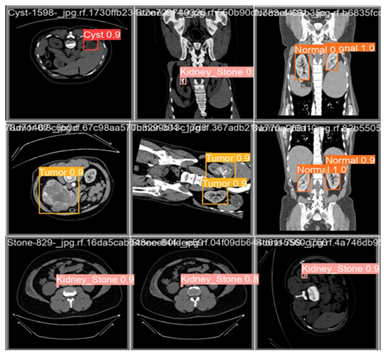
- Published in Departmental News, ECE NEWS, News, Research News
Dr Basu Pens a Book on Life’s Boulevard
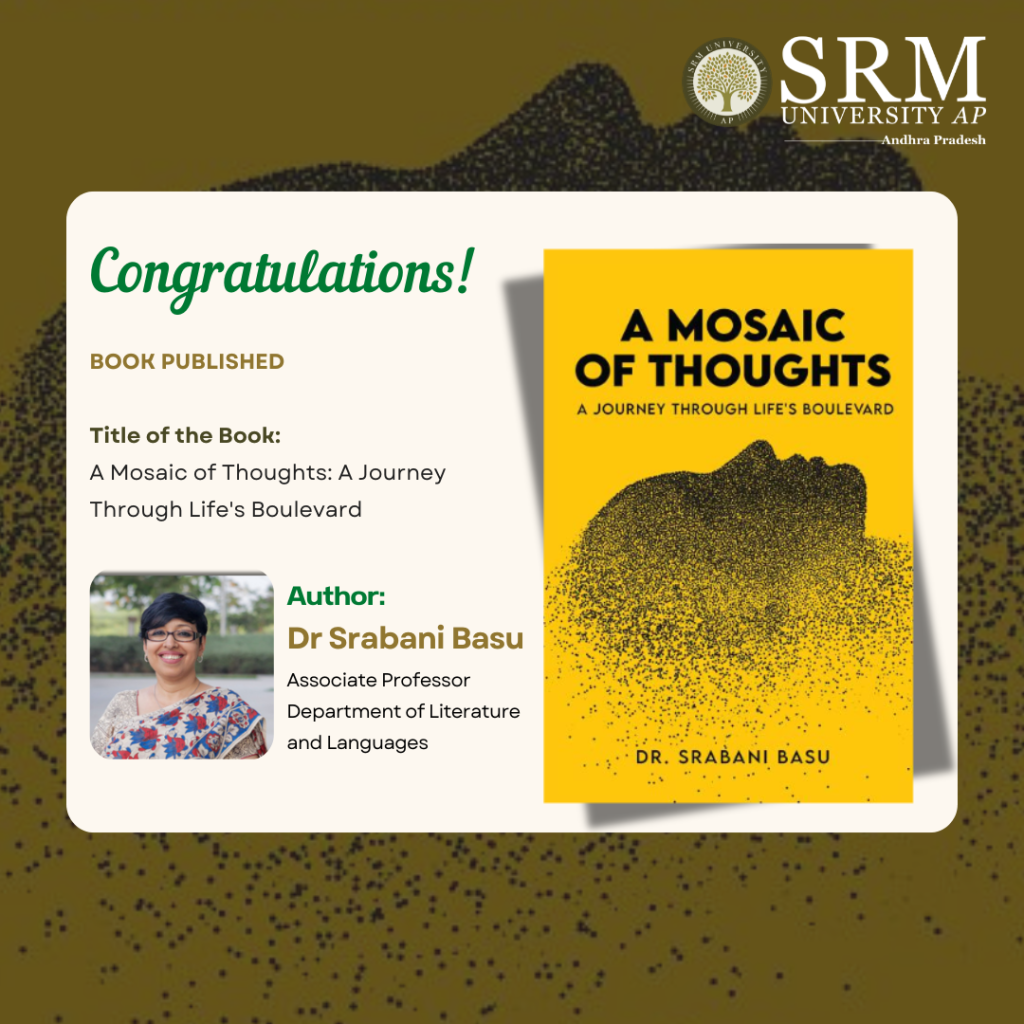 In the esteemed corridors of academia, where the pursuit of knowledge intertwines with the art of mentorship, Dr Srabani Basu emerges as a figure of inspiration and innovation. Nestled within the vibrant community of SRM University-AP. Dr Basu is not just an Associate Professor in the Department of Literature and Languages, but a beacon of intellectual and administrative prowess. Her recent publication, A Mosaic of Thoughts: A Journey Through Life’s Boulevard, is a book of 12 insightful articles that recount interesting snippets of life and experiences both in Academia and Corporate.
In the esteemed corridors of academia, where the pursuit of knowledge intertwines with the art of mentorship, Dr Srabani Basu emerges as a figure of inspiration and innovation. Nestled within the vibrant community of SRM University-AP. Dr Basu is not just an Associate Professor in the Department of Literature and Languages, but a beacon of intellectual and administrative prowess. Her recent publication, A Mosaic of Thoughts: A Journey Through Life’s Boulevard, is a book of 12 insightful articles that recount interesting snippets of life and experiences both in Academia and Corporate.
Abstract:
Dive into “Mosaic of Thought,” a captivating collection of 12 insightful articles exploring the intricacies of contemporary life. This book challenges conventional thinking with themes such as “Are We Manufacturing Countless Bricks in the Wall?” questioning conformity in education and society, and “Of Apes, Leaders, and Organisations,” delving into the primal roots of leadership. Navigate learning complexities in “Is Your Map Meeting Your Learner’s Map?” and confront harassment in “Bullies of All Colours.” Discover the culture of blame in “Blame is the Name of the Game,” and re-imagine cartoons with “Re-discovering Tom and Jerry Through a Quantum Lens.” Each article offers unique perspectives, from fleeting moments in “The Irreplaceable Moments Explored” to impactful first impressions in “Of Halos and Horns.” With humour and seriousness, “A Comedy of Ctrl C and Ctrl V” critiques digital originality, while “Echoes of Influence: A Caveat” warns of the impact of words. This collection is a thought-provoking mosaic for understanding the multifaceted canvas of life.
About the Author:
Dr Srabani Basu, with a distinguished career spanning over 29 years, is an accomplished academic and corporate trainer. Currently serving as an Associate Professor in the Department of Literature & Languages at SRM University, A.P., she has an extensive background in education and training. Dr Basu earned her PhD in English from IKSVV (India’s first Music & Fine Arts University) in Chhattisgarh, India, in 2003. She also holds a PGDBM in Public Relations from Bhavan’s College of Communication & Management, Kolkata, and an MS in Psychoanalysis from IPMS, Mumbai, with a specialization in Students’ Psychology.
Dr Basu has held significant roles as a senior corporate trainer, master coach, content developer, and organisation development specialist. Her experience includes training across diverse industries such as media, banking, telecom, IT, ITES, engineering, FMCG, manufacturing, and education. Her expertise lies in delivering life – skills solutions and providing qualitative improvements. With a profound understanding of human psychology, Dr Basu excels in creating engaging and effective training and classroom sessions that empower participants and students in fostering individual creativity.
In addition to her academic and training roles, Dr Basu is a certified Career Transition Coach, a Neuro-Linguistic Programming (NLP) Master Practitioner, and a Gestalt Master Practitioner. She adeptly customizes her content to match the experience level and knowledge of her target audience and often integrates insights from multiple disciplines to provide holistic learning for the learners. She strongly believes that “Our ambition should be to rule ourselves, the true kingdom for each one of us; and true progress is to know more, and be more, and to do more.”
We wish her all the best for her book and hope for many more to come.
For more details:
https://notionpress.com/read/a-mosaic-of-thoughts?book=published&utm_source=share_publish_email&utm_medium=email
- Published in Departmental News, English news, News, Research News
Research to Revenue: 3-day Workshop Concludes
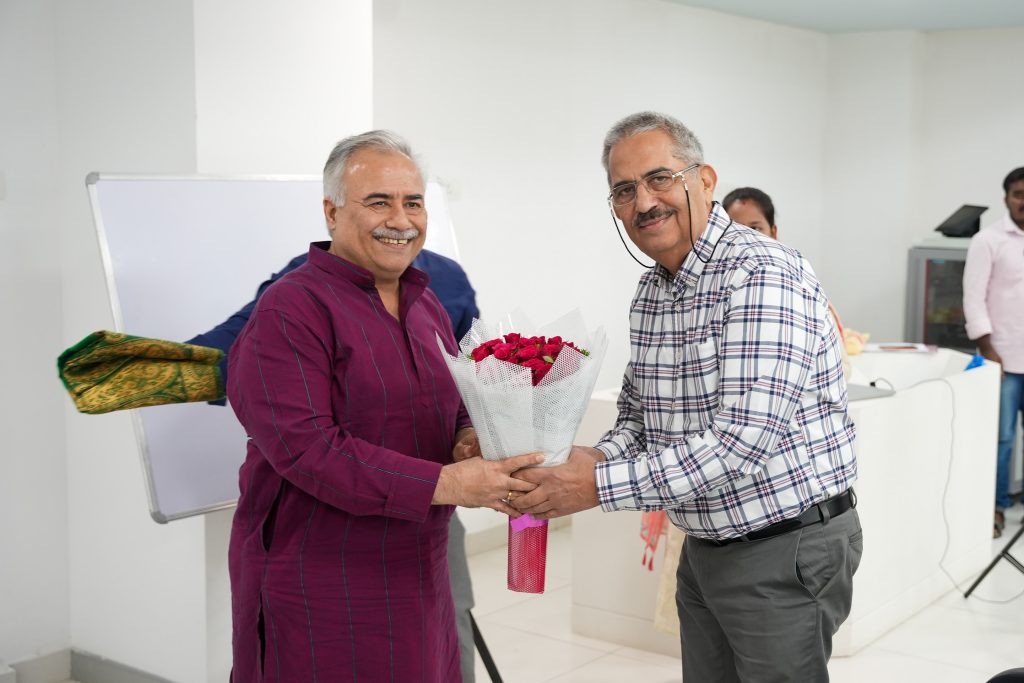 The Office of the Dean-Research and IPR Cell at SRM University-AP hosted a highly impactful 3-day Workshop on “Research Commercialisation.” The workshop was graced by industry expert Mr Rakesh Sharma, a leading figure in business restructuring and global marketing. Mr Sharma with his notable experience of 38 years at Philips, imparted valuable insights on innovation, venture development, and commercialisation.
The Office of the Dean-Research and IPR Cell at SRM University-AP hosted a highly impactful 3-day Workshop on “Research Commercialisation.” The workshop was graced by industry expert Mr Rakesh Sharma, a leading figure in business restructuring and global marketing. Mr Sharma with his notable experience of 38 years at Philips, imparted valuable insights on innovation, venture development, and commercialisation.
The workshop was attended by faculty and research scholars, all keen on understanding the intricacies of research commercialisation. The inaugural ceremony of the workshop was highlighted by the felicitation of Mr Sharma by the Vice Chancellor, Prof. Manoj K Arora, along with Prof. Ranjit Thapa, Dean—Research; Deans of the three schools; Prof. G S Vinodkumar, Coordinator—IPR Cell & Convenor of this workshop; and other senior faculty members.
In his address, Prof. Manoj K Arora underscored the critical role of research, he urged the attendees to “think differently and change your mindset to unlock the boundless potential of your research and innovation.” He engaged with faculty and research scholars, seeking their perspectives. Prof. Ranjith Thapa, the Dean of Research, presented an overview of the varsity’s research capabilities, spotlighting its achievements in Q1 publications and patents across different departments.
Day 1– The workshop kicked off with Mr Sharma encouraging participants to voice their queries and concerns about commercialisation. Key discussion points covered included linking university research with practical applications, the transformation of patents and research into industry-ready products, understanding market needs, fundraising for research projects, and leveraging humanities and liberal arts in patent implementation. Mr Sharma engaged with each of the queries and closely explained to the students with simple and easy-to-understand examples, thereby making the session worthwhile and interesting.
Day 2—Scholars had the opportunity to present their published and granted patents. They received constructive feedback from faculty and Mr Sharma and understood how these patents could be further developed for commercialisation, thereby leading to fruitful discussions on improving and materialising these ideas.
Day 3– A significant outcome of the workshop was the proposal to establish a new centre for research commercialisation designed to offer students an in-house pathway to commercialise their patents. This initiative received widespread acclaim from all participants and sparked engaging discussions about transforming research into viable business ventures, facilitated by the session by the Director of Entrepreneurship and Innovation, Mr Sidharth Shankar Tripathy.
The workshop offered a crucial platform for students, offering both inspiration and guidance in their pursuit of entrepreneurship. The event was specifically designed for all PhD Scholars who are currently working on their research papers and looking for ways to commercialise their innovative ideas, projects, or inventions.
Through a series of expert-led sessions, interactive discussions, and networking opportunities, students were encouraged to think critically about their project’s potential impact, market readiness, and the pathways to achieving sustainable business growth.
- Published in News, Research, Research News, Research Workshop, Workshop
SRM AP Vice Chancellor Nominated to Prestigious AIU Governing Council
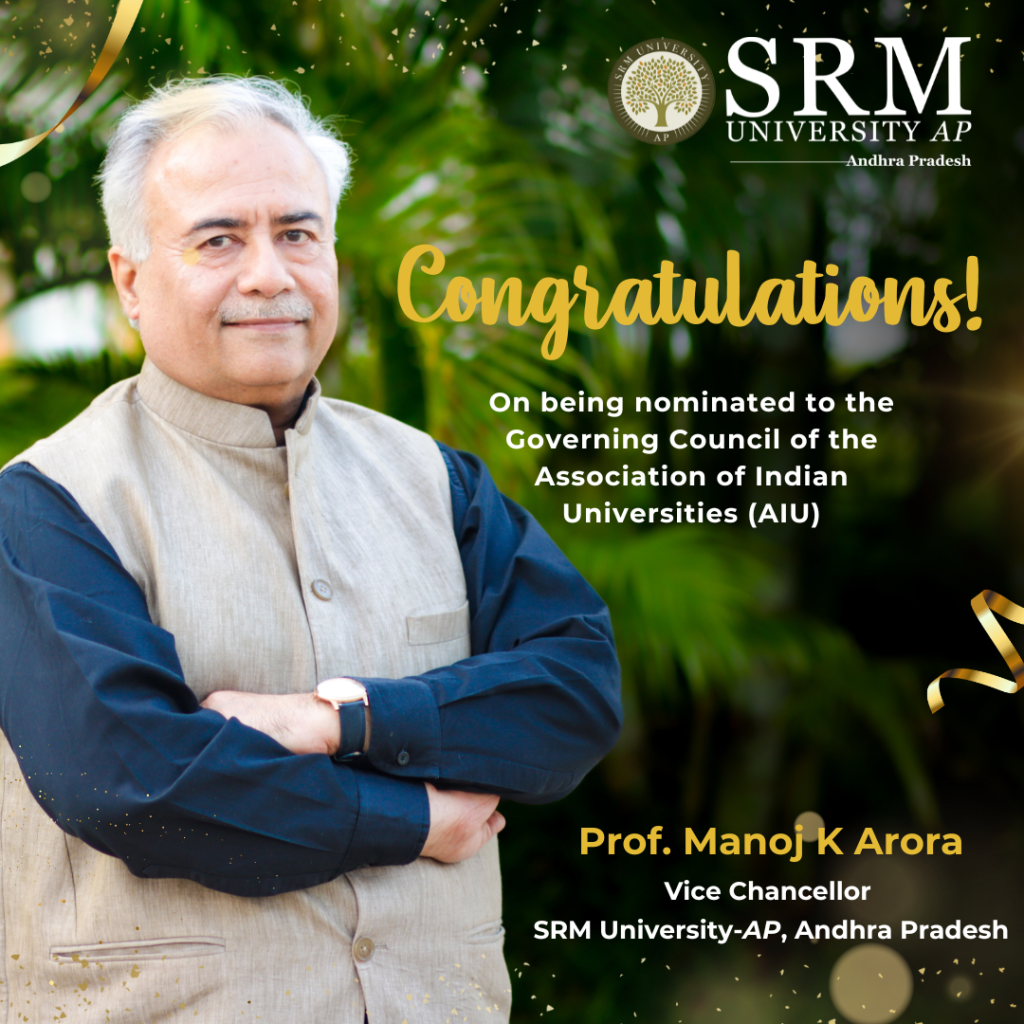 A proud moment for SRM University-AP as it announces the nomination of its esteemed Vice Chancellor, Prof. Manoj K Arora, to the Governing Council of the Association of Indian Universities (AIU). The Association of Indian Universities (AIU) serves as a paramount inter-university organisation actively involved in the advancement and nurturing of higher education.
A proud moment for SRM University-AP as it announces the nomination of its esteemed Vice Chancellor, Prof. Manoj K Arora, to the Governing Council of the Association of Indian Universities (AIU). The Association of Indian Universities (AIU) serves as a paramount inter-university organisation actively involved in the advancement and nurturing of higher education.
On accepting this nomination, Prof. Arora remarked, “I am deeply humbled to have been nominated as a member of AIU and look forward to it. This nomination reflects our collective efforts towards advancing higher education and fostering collaboration, thereby working towards changing the face of higher education in India.”
This notable appointment not only recognises Prof. Arora’s outstanding contributions to the academic fraternity but also underscores SRM University-AP‘s commitment to excellence in higher education. The AIU plays a pivotal role in elevating the quality and accessibility of higher education across the nation. The AIU, with its broad membership including international institutions from Bangladesh, Bhutan, Kazakhstan, Malaysia, Mauritius, Nepal, Thailand, the UAE, and the UK, serves as a platform for global educational exchange and development. Its endeavours are directed toward creating a collaborative and innovative educational landscape, making this nomination significant for SRM University-AP and the broader academic community.
Prof. Arora’s nomination is a moment of pride not only for him but for the entire SRM AP fraternity. The university community extends its heartfelt congratulations to Prof. Arora on this noteworthy achievement and eagerly anticipates his ongoing guidance and foresight in steering the course of education in India.
International Yoga Day Observance: A Reflection of Tradition and Modern Wellness
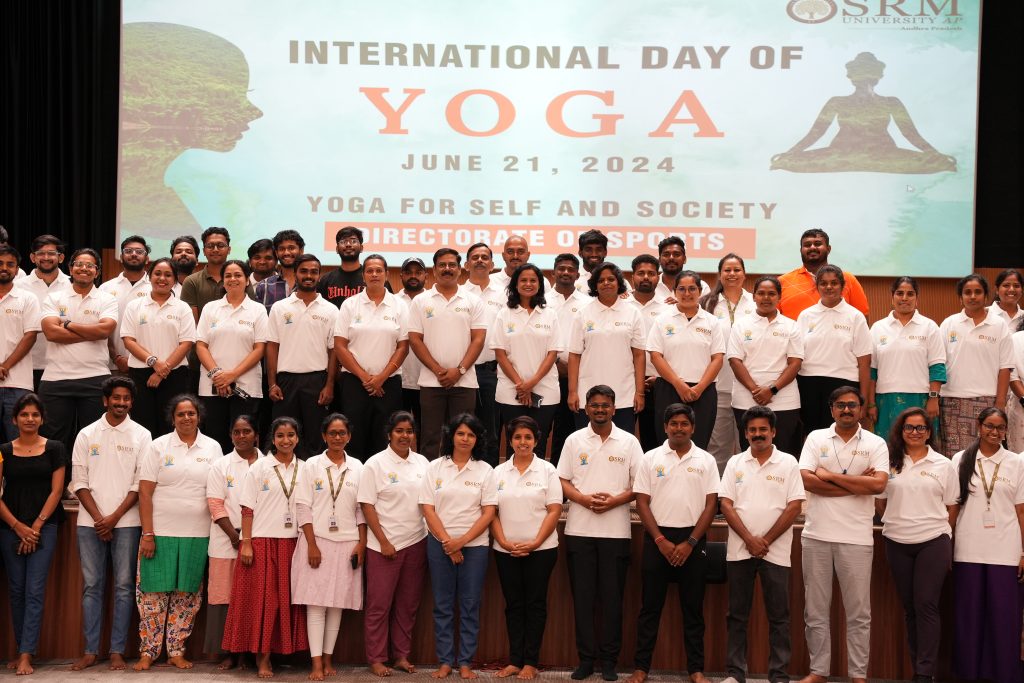
On June 21, SRM University-AP marked International Yoga Day with commendable enthusiasm, drawing the active participation of faculty, students, and staff. This significant event, organised under the auspices of the Directorate of Student Affairs and the Directorate of Sports, not only highlighted the importance of yoga in contemporary life but also emphasised the unifying power of this ancient practice.
The ceremony commenced with a warm welcome address by Mr Anil Kumar Nigam, Director of Student Affairs, setting a positive tone for the day. Mr Nigam further remarked on the profound significance of International Yoga Day, he stated, “Yoga empowers individuals to take charge of their own well-being and enables them to stand strong in the face of adversities”
The celebrations featured a captivating demonstration of traditional yoga led by the yoga instructor, Ms Moni, followed by partner yoga and collective sessions involving faculty, staff, and students. These activities showcased not just the flexibility of the participants but also underscored the principle of unity between mind, body, and soul, fostering a sense of inner peace.
Registrar, Dr R Premkumar, in his address, imparted a poignant message on the essence of self-commitment as the foundation for any path one chooses to follow. He further remarked that “Yoga’s role in bringing about the well-being of oneself and society is profound,” underscoring the transformative power of yoga in achieving personal health and inner peace.
The event not only celebrated the timeless values of peace and harmony inherent in yoga but also reinforced the varsity’s commitment to fostering a holistic educational environment. Ms Sushmita Kumari, Assistant Director of Sports, expressed her heartfelt appreciation for the enthusiastic participation of all attendees and encouraged everyone to continue on their transformative journey of wellness and harmony.
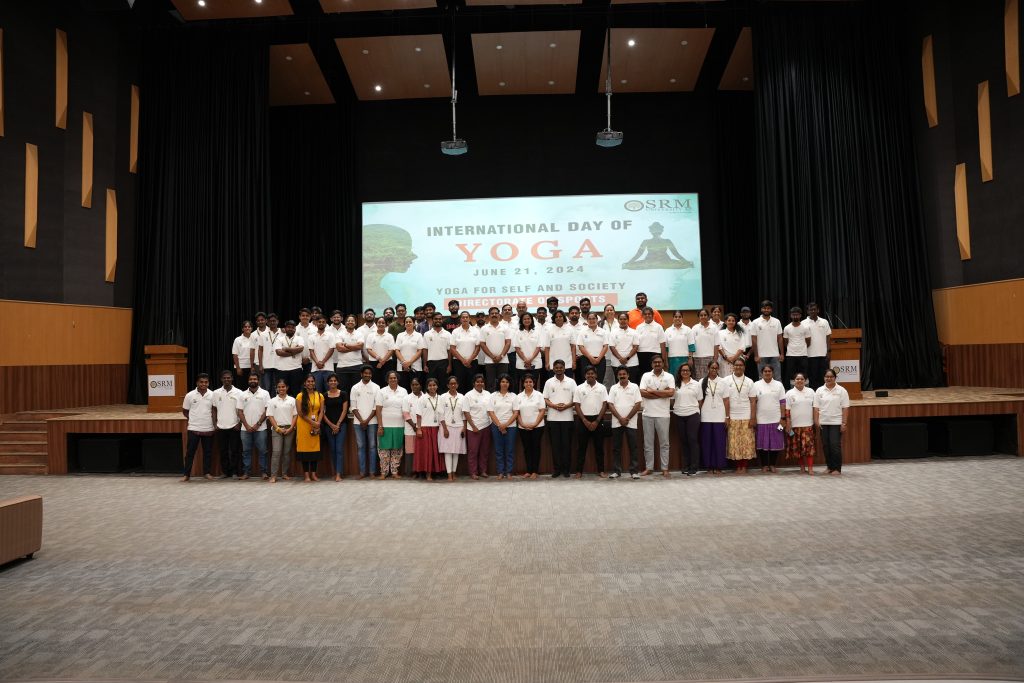
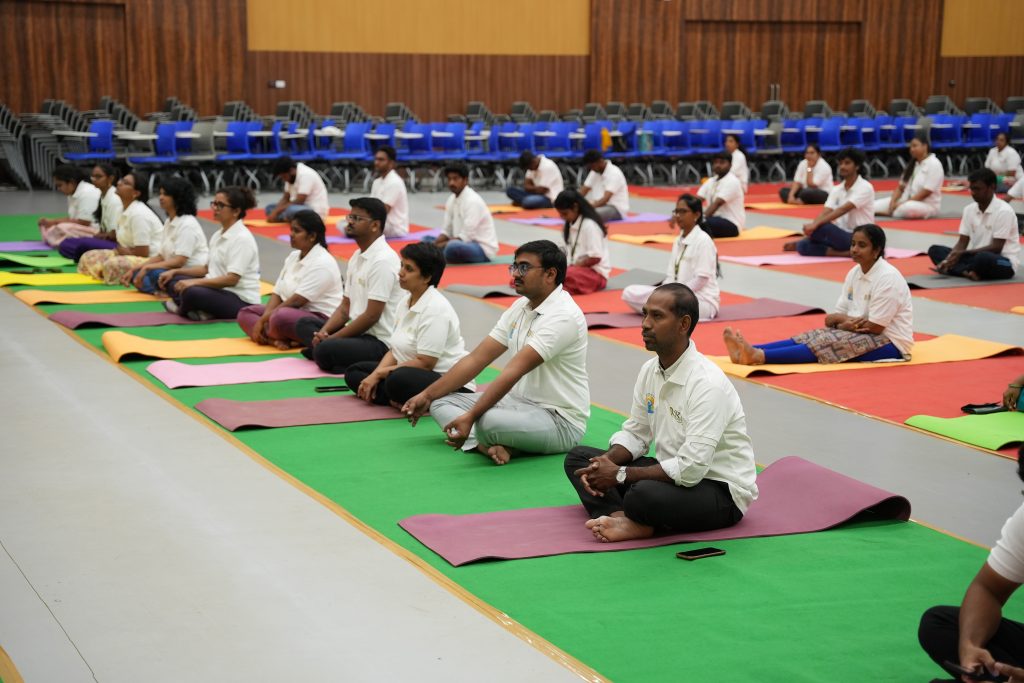
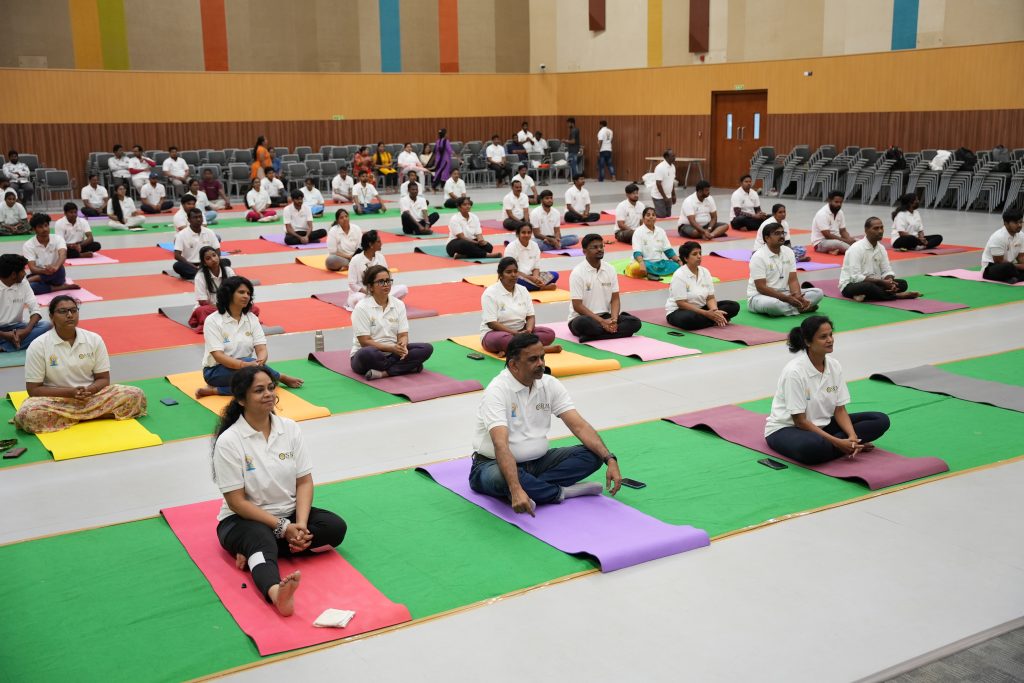
- Published in News, Sports News, student affairs news



